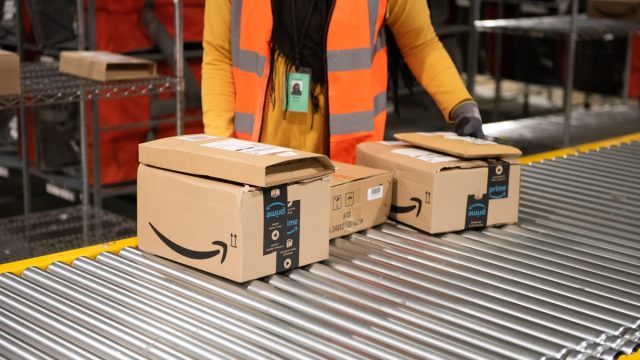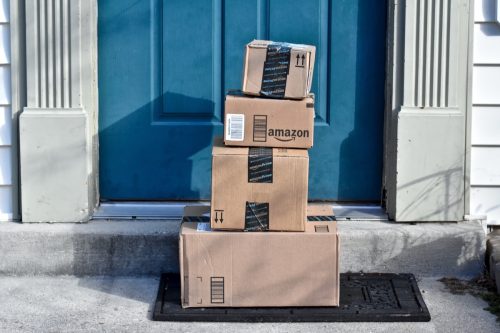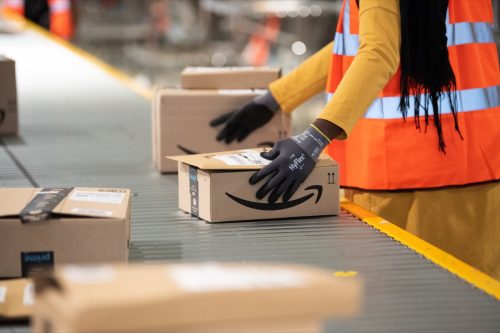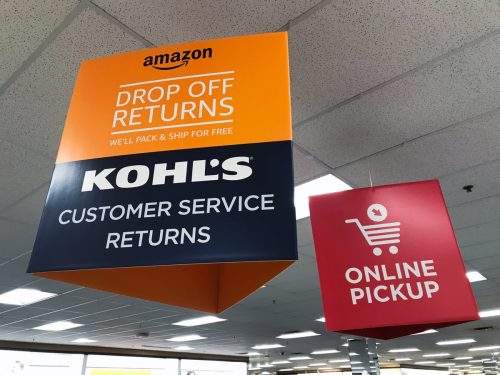5 Warnings to Shoppers From Ex-Amazon Warehouse Workers

Let’s face it—shopping on Amazon is pretty convenient. Nearly everything on your shopping list can be on your doorstep in 48 hours or less. That’s thanks in large part to the company’s network of warehouses, otherwise known as fulfillment centers, where Amazon employees pack up whatever it is that you’ve ordered. It sounds like a simple enough operation, but former employees say that there are a few things you should know—and they’re offering some words of caution. Read on for five warnings from ex-Amazon warehouse workers.
READ THIS NEXT: 5 Warnings to Shoppers From Ex-Amazon Delivery Workers.
1
They know if you ordered something scandalous.

The beauty of online shopping in general is the associated anonymity, especially if you’re purchasing something you wouldn’t buy in person. But if you think your purchases are a secret—they’re not.
In response to a Reddit “ask me anything” (AMA), a commenter asked about the stranger items employees see coming through. In response, the ex-worker @bigougit said that adult toys were the most surprising items they saw.
On a separate Reddit AMA, another employee @BlessBless echoed this. “[I saw] lots of obscure sex DVDs and toys,” they wrote.
2
They have no control over how your order is packed.

We’ve all been there—your Amazon package arrives and it’s just one item in a gigantic box or three random items all shoved together. You might believe that employees choose what to box up and when, but that isn’t the case.
Redditor @BlessBless, who used to work as a “picker”—an employee who fills up the bins for orders—said that a scanner tells them what to grab and when.
“My scanner would then tell me when that particular bin was completed (sometimes it would only have one tiny item in it), at which point I’d move to the next one,” the worker wrote on Reddit, noting that they would fill two bins at a time. “When both were filled, I’d take them to a nearby conveyor belt and stick them on, where they would travel to the packagers.”
Once there, packagers are, again, just following instructions. “Everything is organized in the warehouse (DVDs with DVDs, books with books, etc.), but workers go and put seemingly random items on a cart,” @bigougit wrote on the separate thread. “Then that cart goes into a packaging station where a worker is told which box to put an item in, the computer decides all of this on [its] own.”
This is apparently in line with Amazon’s strategy to optimize the packaging and shopping process, another Redditor added. But as far as those larger boxes go—which seem wasteful to many consumers—that’s out of employees’ hands, too.
“The computer tells us to put the product in said box or no box at all. If you suggest a different box, you get flagged,” a Redditor wrote in a separate post.”That barcode printed on the box tells the computer upstairs if it’s the right box according to the computer you’re working with. When they don’t match up, it gets kicked out and sent back down creating issues.”
READ THIS NEXT: 6 Warnings to Customers From USPS Mail Carriers.
3
Some people do steal, but warehouse security is tight.

Across Reddit, former Amazon warehouse employees mention the strict security protocols.
“We had to leave everything at the door…cell phones, ipods, watches, anything that could be sold at Amazon was off limits (which is everything),” @BlessBless wrote.
One former employee explained that workers have to go back through security checkpoints after clocking out for lunch. This may keep more valuable items from getting pilfered, but food is an easier target.
“Food is a big one,” commenter @what_comes_after_q wrote in response to a query about theft. “Security makes it hard to steal anything valuable (also very valuable goods are in a secured area). Food on the other hand, you can literally [eat] the evidence.”
Another Redditor, @Kaynetal, said that food theft happened “all the time” when they worked at an Amazon warehouse.
“As a picker it was my job to find each customers order in the warehouse, put it in a bin, fill that bin up, and put it on the conveyor belt when full, so I was the one that had to literally find your order, and in doing so, you come across a lot of things like candy and gum that have been torn open because I assume someone wanted a piece,” they wrote.
@Kaynetal said that they only ever saw candy and gum stolen, but another former worker, @Smokey_Strafe, said that they’ve also seen gift cards stolen. No matter what was stolen, however, the employees faced consequences.
“Someone got arrested for stealing $15,000 worth of $100 Xbox Live gift cards. Someone also got fired for stealing a candy bar worth $0.70,” they wrote.
4
There’s no cap on what you can return—but you might get flagged.

In yet another AMA post on Reddit, a warehouse employee addressed a question about returns, confirming that Amazon isn’t going to stop you from sending items back.
“There is no restriction on returns, you can return everything you purchase that qualifies for a return with no penalties,” @AmazonAssociate09876 wrote.
However, Amazon’s systems store all relevant details about your order history, so if you’re abusing the return policy, they’ll know.
“The computer flags anyone with a high return to purchase rate,” the Redditor wrote. “For example, if you have made a total of 500 purchases since your account was made and have returned 251 items, your account gets flagged. This often means nothing more than a simple note. If you have a high return volume over a short period though, the computer bumps it up to a fraud specialist who checks if anything looks sketchy.”
From there, the situation might be escalated, which can result in your returns being double-checked when back at the warehouse. “If you aren’t doing anything wrong, you will never notice a thing. Most of the time, it’s not a big deal,” @AmazonAssociate09876 wrote.
For more retail warnings delivered straight to your inbox, sign up for our daily newsletter.
5
Warehouse workers might get “dibs” on damaged items.

Ever wondered what happens to items that are near expiry or damaged? According to former Amazon warehouse workers, employees might get the opportunity to bring them home.
“We would get first dibs on ‘damaged’ items and they allowed us to pick through the about to expire stuff before we sent it out to the food banks,” Redditor @Goobermeister wrote on @Kaynetal’s AMA. “Lots of organic ribeyes, because it was hard to unpack and stock them because nobody wanted to work in the fridge/freezer to get it done. And everyone went home on valentines with multiple two dozen bouquets of roses because they weren’t up to par (they looked fine to me).”
NOTE: Best Life only includes information from social media and job boards when there is corroboration from multiple sources. These comments have not been independently verified, however, and are the opinions of the people who posted them.